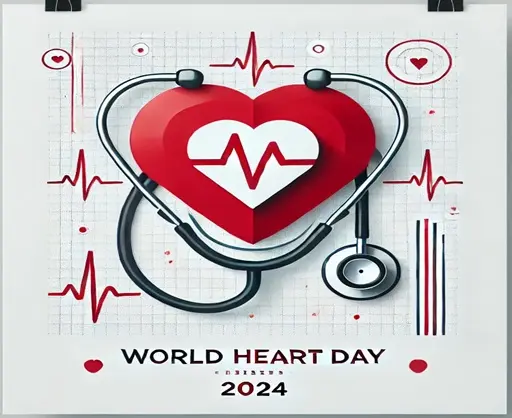Did you know that cardiovascular diseases claim more lives annually than any other cause, yet most heart conditions are preventable? World Heart Day, celebrated annually on September 29th, is a global initiative aimed at raising awareness about cardiovascular disease (CVD). This silent killer is a leading cause of death worldwide, affecting millions of people of all ages and backgrounds. Understand the risk factors and take proactive steps to lower your risk of heart disease.
Why World Heart Day Matters
Cardiovascular diseases are on the rise and are the leading cause of death globally, responsible for approximately 18 million deaths each year. These conditions don’t discriminate by age, gender, or background, affecting millions globally. The primary goal of World Heart Day is to promote the preventability of heart disease and stroke by adopting healthy habits and staying informed about heart health.
The theme for World Heart Day 2024, "Use Heart for Action," highlights the importance of taking steps to protect your heart health. It encourages individuals to:
Understand heart health: Learn about risk factors, symptoms, and prevention strategies.
Adopt a healthy lifestyle: Incorporate regular exercise, a balanced diet, and stress management techniques.
Be mindful of risk factors: Recognize and address personal risk factors such as high blood pressure, high cholesterol, smoking, and diabetes.
- Seek regular medical care: Schedule regular checkups and screenings to monitor your heart health. See your doctor for regular checkups to monitor your blood pressure, cholesterol, and other health markers.
How to Take Charge of Your Heart Health
Eat Heart-Healthy Foods:
Take a balanced diet rich in fruits, vegetables, whole grains, lean proteins, and healthy fats like those found in olive oil, nuts, and fish. Avoid processed foods high in salt, sugar, and trans fats.
Exercise Regularly:
Physical activity strengthens the heart and improves circulation. Aim for at least 30 minutes of moderate exercise most days of the week.
Quit Smoking:
Giving up smoking is one of the best things you can do for your heart. It lowers blood pressure, improves circulation, and reduces the risk of heart attacks.
Limit Alcohol Intake:
Control your alcohol consumption. Stick to the recommended limits, not more than one drink per day for women and two for men.
Monitor Blood Pressure & Cholesterol:
Manage your blood pressure and cholesterol levels is key to preventing heart disease. Regular check-ups with your healthcare provider are important.
Manage Stress:
Chronic stress can increase the risk of heart disease. Meditation and yoga are the best ways to cope up with stress.
Get Enough Sleep:
Sleep is essential for heart health. Adults should aim for 7-9 hours of sleep per night to maintain overall well-being and reduce the risk of cardiovascular issues.
Common Cardiovascular Risk Factors
Several factors can increase your risk of developing cardiovascular disease, including:
High blood pressure: A persistent elevation of blood pressure can damage the heart and blood vessels.
High cholesterol: Elevated levels of LDL cholesterol can contribute to plaque buildup in the arteries.
Smoking: Smoking damages the blood vessels and increases the risk of blood clots.
Diabetes: People with diabetes are at a higher risk of heart disease.
Obesity: Excess weight can strain the heart and increase the risk of high blood pressure and cholesterol.
Physical inactivity: A sedentary lifestyle can contribute to heart disease.
Family history: A family history of heart disease can increase your risk.
Health Screenings for Heart Diseases
Several diagnostic tests may be recommended depending on your symptoms and risk factors:
Electrocardiogram (ECG or EKG): Records the electrical activity of your heart, helping to identify irregular heart rhythms or signs of a heart attack.
Echocardiogram: Uses sound waves to create images of your heart, allowing your doctor to assess its structure and function.
Stress Test: Evaluates how your heart responds to physical stress, such as exercise or medication. This can help diagnose coronary artery disease.
Cardiac CT Scan: Uses X-rays to create detailed images of your heart and blood vessels.
Cardiac MRI: Uses magnetic fields and radio waves to produce images of your heart and blood vessels.
Blood Tests: Can measure cholesterol levels, blood sugar, and other markers of heart health.
Coronary Angiography: A procedure that uses X-rays to visualise the arteries that supply blood to your heart. This can help identify blockages or narrowing.
If you or your loved ones are concerned about heart health or experiencing symptoms of cardiovascular disease, Don’t wait—connect with HOSPIDIO today for access to top heart specialists and personalized care worldwide.
“By celebrating World Heart Day, we take a vital step toward a healthier, heart-conscious world. Let’s all use our hearts for action.”
Himang
Author
Himang Gupta is a skilled medical content writer with a Bachelor's degree in Biotechnology and extensive experience crafting engaging and informative blogs. Passionate about simplifying complex medical topics, he ensures his content resonates with readers. When not researching or writing, Himang enjoys scrolling Instagram, cracking jokes, and savoring the flavor of elaichi—his ultimate treat after a productive writing session.
Guneet Bindra
Reviewer
Guneet Bhatia is the Founder of HOSPIDIO and an accomplished content reviewer with extensive experience in medical content development, instructional design, and blogging. Passionate about creating impactful content, she excels in ensuring accuracy and clarity in every piece. Guneet enjoys engaging in meaningful conversations with people from diverse ethnic and cultural backgrounds, enriching her perspective. When she's not working, she cherishes quality time with her family, enjoys good music, and loves brainstorming innovative ideas with her team.

